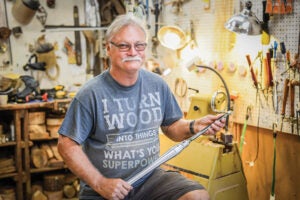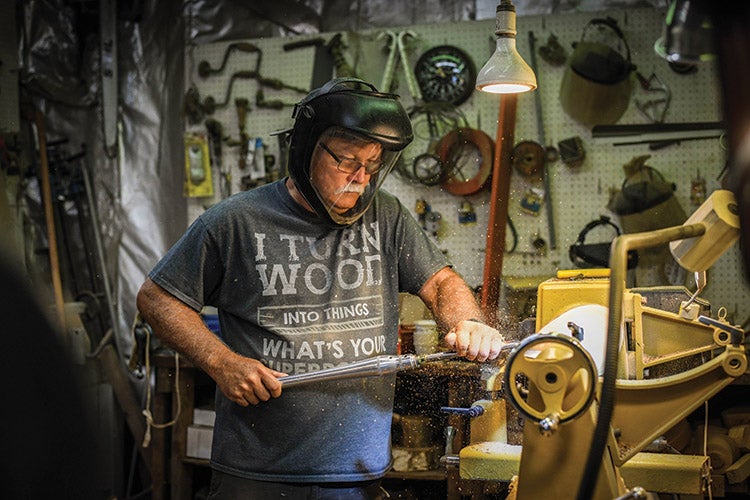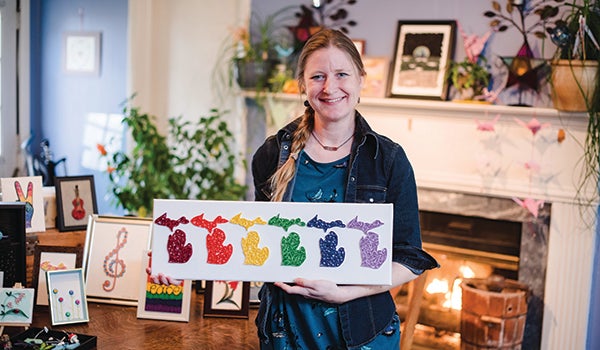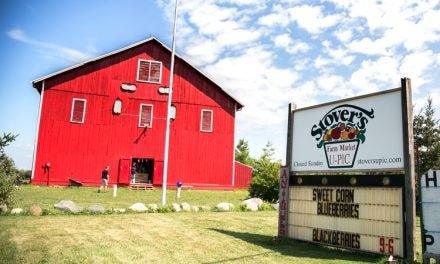Photography by Emily Sobecki
Randy Kniebes’ woodshop is in surprisingly good order for an active shop. He’s looking for his notebook, the one where he tracks the moisture content of the wood he’s working with.
“Oh,” he says. “My wife cleaned the shop and put my papers away.”
He calls out to her and, naturally, she knows exactly where it is.
Randy is the owner of Randy’s Woodshop in Coloma. He’s an active kind of guy. His mind travels a million miles an hour, and it’s clear the rest of him struggles to keep up with how fast he’s thinking.
He has been running his business out of his unattached garage (with no room for a vehicle) since 2017. His shop is getting cleaned because he recently erected a 40-foot-by-30-foot pole barn next to his current shop, which will offer him more room to ramp up production.

His property is packed full of wood projects he has made. There’s the 50-foot bridge he build to cross a small creek. There’s an enormous jungle gym for his grandchildren that is no doubt the envy of any child that sees it. There are two decks he has built onto his house. And there are the 23 cabinets in his kitchen.
He may be retired, but by the looks of things, he has no intention of slowing down.
“Keeping up with the number [of bowls people] want [is a challenge],” Randy says. “It’s keeping up with [making] the bowls. I can’t just go get them.”
You can hear in his voice that he’s frustrated he can’t make them any more quickly, because he’d really like to.
When he’s in the groove, Randy is able to shape bowls out of most woods in less than a few hours, many in less than an hour. More time is required to sand and finish them, though. He says he makes about 100 to 200 pieces each year.
When talking to Randy about wood, one should be prepared to learn. A lot. He was a middle school science teacher in Coloma for 36 years (before retiring in 2010), and he still loves to teach people.
“Most kids that need help, they need help with their house. They’re going to have an apartment or something,” he says. “I’ve always been a hands-on teacher. I think it’s more important than the book stuff — the book stuff is always behind because schools don’t have the money.”
In fact, Randy said he has always known that he wanted to work with his hands. It’s what drew him to woodworking in the first place.
“I’ve always wanted to work with my hands to make things,” he says. “I don’t know what it was, what the bug was that made me look online to find out about bowl turning.”
He recalls that his neighbor down the road had been a carpenter and was looking to sell a lot of his equipment. Randy saw the opportunity and decided to buy up a lot of his tools.
Randy has been working with wood and making bowls with live edges for 30 years. But one of his first pieces, and the one he’s most proud of talking about, is one that he made for his then 5-year-old daughter.
“I made her a solid walnut table from my brother’s tree,” he says. “She now has a baby girl who’s sitting there in a chair playing on the same exact thing.”
Crafting pieces that last is Randy’s thing. He wants his customers to be happy with their purchase. He says that in the four years of running his business, he hasn’t had a customer want to return their piece.
“Nobody’s come back yet,” he says. “Nobody’s come back and said, ‘well, the bark didn’t stay on.’”
Randy exclusively uses local wood. If he hears about someone cutting a tree down, his ears perk up, and he tries to get a hold of them to see if he can get their logs. Oftentimes, that means he is working with woods like walnut, sassafras, cherry, burr oak, birch, red cedar and black locust.

He enjoys getting odd-shaped logs and pieces of wood because that’s what nature provides him.
“My woodturning friends say, ‘Randy, you need to make your wood symmetrical,’” he says. “But my logs aren’t symmetrical; they’re off-center, even. And I say, ‘This is the way it is. This, you know, is the way nature did it.’”
Bowls with a live edge — the natural bark remains on the exterior — are Randy’s specialty. But he also makes candleholders and serving trays.
Both of his shops are full of projects in various stages of completion. Countless wooden pieces sit on tables waiting for their finish to dry, and other projects in production are scattered across available surfaces.
Randy has worn a lot of hats in the past 36 years, but he says the business-side of things has been the most challenging for him to pick up, especially with pricing.
“I don’t see anybody on the internet, Etsy or wherever, selling this kind of stuff, these kinds of bowls,” he says. “I don’t know anything about retailing, I don’t retail things.”
That hasn’t stopped him from trying or learning, though.
More often than not, one can find Randy at different shops and markets around the area, including Skip’s European Farmer’s Market in New Buffalo, Round Barn in Baroda, Pinecrest Christmas Tree Farm in Galien. But in an era of COVID-19, he says one of the best ways is to get in touch with him via email.
Randy says he is truly just excited to be creating things out of wood and playing in his wood shop. In retirement, it’s luck to be able to pursue a passion with the same vigor as Randy.
“I’ve got this [new building],” he says. “This is my dream shop.”





